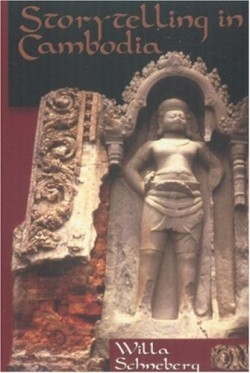Storytelling in Cambodia
In Cambodia, storytelling is a brutal business, rife with violence, starvation, and unrest. The author, who worked with the U.N. Transitional Authority there during the early 1990s, tries to give voice to the people hunted by the Khmer Rouge, abandoned by the U.S., attacked by the Vietnamese, colonialized by the French. After all the wars waged on the country, Schneberg writes to show the people behind the victimization. Often employing found poems and the masks of persona, the poet voices Sita from the Hindu epic The Ramayana, the Phnom Penh refugees, and Pol Pot’s wife, Khieu Ponnary, among myriad others.
The book begins with an introduction by Cambodian poet U Sam Oeur and translator-poet Ken McCullough. The two offer a guide for reading the book, suggesting how the parts assume the whole. Schneberg, winner of the 2002 Oregon Book Award for Poetry, possesses the ethos of having lived and worked in Cambodia, although that ethos occasionally thins.
Schneberg writes of speaking to a Khmer Rouge survivor, who tells her story because the poet is Jewish. Schneberg tells a Holocaust story, hoping that although the story is not her own, it will soothe the survivor. This self-awareness makes an interesting tension—what is it like as a white, female Westerner to be the voice for an ancient Asian culture? The book does not ultimately answer this question, but Schneberg asks and answers a number of others.
What constitutes the story of Cambodia? Is it the early myth of the Ramayana with its violence that foreshadows the country’s turmoil in the later twentieth century? Is it the time of the Khmer Rouge or the survival of the culture after the onslaught? Does its history begin with the first archeologist to “discover” its secrets? Schneberg plays with each of these histories, always asking how one led to the other, travelling from Kent State to Cambodia to Paris to Ireland.
Cambodia became famous for its landmines, and from this fact, Schneberg imagines the voice of a prosthesis maker; she writes in his drunken, shocked voice: “all the pathetic imitations / have become real, brown and fleshy / with splayed toes that will soon know / the goosh of wet earth and will run / outside and fling themselves / back into the family of the body.” This poem represents some moves typical of this poet: her lines read with the rhythms of prose; her personas are often unexpected; and her poems end with strong, metaphoric images.
The book covers a great deal of ground, perhaps too much. Some of the story gets swallowed by the sheer number of speakers. Perhaps fewer speakers, each with longer stories, might have better illustrated the plight of the country. Still, for those interested in history plainly spoken, Schneberg offers a glimpse into a country of mysterious people and almost unimaginable violence.
Reviewed by
Camille-Yvette Welsch
Disclosure: This article is not an endorsement, but a review. The publisher of this book provided free copies of the book to have their book reviewed by a professional reviewer. No fee was paid by the publisher for this review. Foreword Reviews only recommends books that we love. Foreword Magazine, Inc. is disclosing this in accordance with the Federal Trade Commission’s 16 CFR, Part 255.

